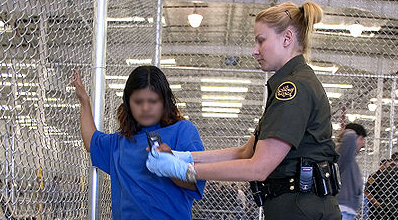I’ve often found it a bit odd how civil libertarians get so upset about the introduction of strict travel regulations post-9/11. The TSA is a favourite whipping boy of civil libertarians, across the political spectrum. Whether you lean Democratic, Republican, Green, or Libertarian, you have little love lost on the TSA. A number of potential explanations come to mind:
- Most post-9/11 intrusions on civil liberty are abstract, but everyone who flies gets exposed to this
- People get upset that an act as mundane as human movement is presumed to be a danger until proven otherwise
- The opacity and arbitrariness of transport regulations terrify and upset people
The true answer is likely to be some combination of these (plus other factors I’ve probably not even thought of). When reading security blogger Bruce Schneier’s summary of the harms of post-9/11 security, factor #3 especially stood out to me. This paragraph in particular stuck a chord:
…if you’re on a certain secret list, you cannot fly, and you enter a Kafkaesque world where you cannot face your accuser, protest your innocence, clear your name, or even get confirmation from the government that someone, somewhere, has judged you guilty. These police powers would be illegal anywhere but in an airport, and we are all harmed—individually and collectively—by their existence.
Schneier is wrong on that last point — these police powers apply to almost any non-citizen at almost any border control in the world. And we sit down and take for granted that this is right. Even if you have a visa, you are never guaranteed entry. In many countries, the US included, your entry is entirely at the discretion of the enforcement officer at the checkpoint, who can decide that, for whatever reason, you shouldn’t be allowed in.
It’s difficult I find to really explain what this feels like to someone who has never experienced it personally. My aunt, who has been a US citizen for two decades, still recounts vividly how happy she was to gain citizenship because she would no longer live in fear of her green card being taken away, or of being denied entry every time she re-entered the US after visiting family and friends abroad. At my company, stories abound of people who flew home to visit relatives and wound up being stuck there for months after they were denied re-entry to the US for various bureaucratic reasons. And figuring out this Kafkaesque maze of bureaucracy is more opaque than you might think: the official position of the US government is that the only way one can see one’s own immigration records on file with the government is to file a Freedom of Information Act request — even if one needs these files to fight a deportation proceeding.
Governments take liberties with foreigners’ rights in ways that they would never dream of doing to their own citizens. The concept of due process is at best tenuously applied to dealing with foreigners. One UK Minister recounts seeing whole carts of files being wheeled past him so that officials could truthfully tell Parliament he had “reviewed the files” of those requesting asylum. The way the governments of the world treat people who simply want to cross an arbitrary line drawn on the map is morally wrong.
None of this is to say we ought to abolish borders: open borders and no borders are not the same thing (that’s a debate we can have another time). Those opposed to the “security theatre” that has sprung up since 9/11 don’t demand that law enforcement vanish from the world’s airports. Essentially all of them support the maintenance of airport security checkpoints. Likewise, open borders is not about abolition of border controls: it is about properly according every person the dignity and respect which every human being deserves.
Humane immigration policies would provide prospective visitors and immigrants a clear process for obtaining visas, and grant visas as of right except in unusual cases (such as those with evidence of criminal history or the contagiously ill). All those with visas would be guaranteed entry, again, except in extraordinary cases. Those facing immigration proceedings would be assured access to their files, and would be assured that their case gets the attentive review demanded by due process. These things might sound elementary, but they are near-wholly missing from the immigration process today.
If civil libertarians protest restrictions on domestic transportation, one wonders why so many are silent about the evils of deportation or the arbitrariness of visa policy. The same problems that compel these activists to decry opaque and arbitrary government coercion apply even more in spades to foreigners crossing the border. Here, I think the first reason I suggested for civil libertarians’ concern is the predominant one: the problems of immigrants and other foreigners are simply too abstract for most civil libertarians to bother. That’s literally a crying shame — if libertarians think it’s an unimaginable humiliation to deal with the TSA for a few hours every so often in order to travel, they ought imagine having to deal with an even worse bureaucracy every so often in order to hold down your job and live in your home.
The photograph featured at the top of this post is of a Customs and Border Patrol agent conducting a patdown of a Mexican girl being detained. Courtesy of the US government.

